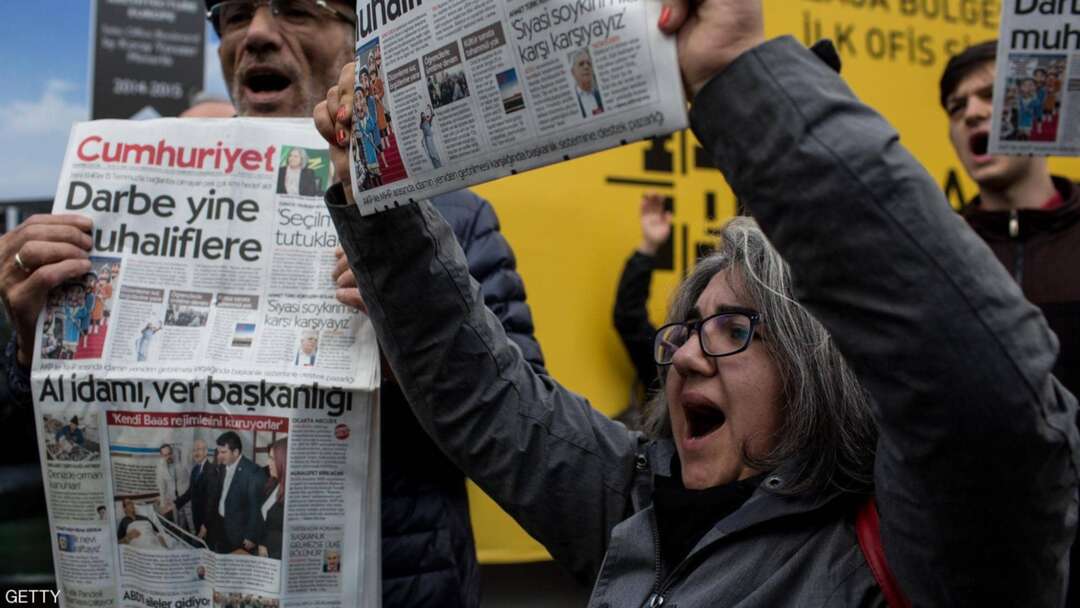-
Erdogan and the press... A coup after the "coup attempt"

Press freedom in Turkey is at stake in the aftermath of the coup attempt
The failed coup attempt in Turkey in 2016 was a watershed moment in the history of democracy and freedoms; the situation has become so dire that many have fled the country—especially journalists.
Turkish President Recep Tayyip Erdogan has been accused of pursuing policies that undermine democracy and human rights. Since then, voices, based on many facts, have risen.
Human Rights Watch declares in a report that Erdogan government has dismissed more than 150,000 public officials for alleged association in the coup attempt or links to the Gülen group. Whereas 64,000 others have been sentenced to prison including about 150 journalists and media worker, and that has turned Turkey to be the world's largest prison for journalists.
Observers believe that the "cleansing" campaign launched by Erdogan against supporters of Fethullah Gülen religious movement, which Ankara accuses of being involved in the coup attempt, has pushed the country into very bad conditions.
The campaign was kind of a coup enforced by Erdogan’s government against his political and press opponents. However, according to the observers, they had nothing to do with Gülen’s movement
In terms of press freedoms, hundreds of Turkish journalists have lost their jobs for claims of supporting the coup, insulting the president and denouncing his campaign in tweets and posts on social media.
According to a 2018 media watchdog report, more than 120 journalists were sentenced to prison for a minimum of five years during the past two years.
In 2017, Ankara blocked Wikipedia because, as Ankara claims, it contained information linking the Turkish state to terrorist organizations.
In last year's World Press Freedom Index, published by Reporters Without Borders, Turkey ranks 157 out of 180 countries.
Not long ago, three journalists were sacked after an interview with former Turkish Prime Minister Ahmet Davutoğlu just 24 hours after it was broadcast on YouTube.
Ankara government controls about 90 percent of Turkish media. Reporters Without Borders says censorship of websites and social media has reached unprecedented levels that reinforce restriction of media freedom in the country.
You May Also Like
Popular Posts
Caricature
BENEFIT Sponsors BuildHer...
- April 23, 2025
BENEFIT, the Kingdom’s innovator and leading company in Fintech and electronic financial transactions service, has sponsored the BuildHer CityHack 2025 Hackathon, a two-day event spearheaded by the College of Engineering and Technology at the Royal University for Women (RUW).
Aimed at secondary school students, the event brought together a distinguished group of academic professionals and technology experts to mentor and inspire young participants.
More than 100 high school students from across the Kingdom of Bahrain took part in the hackathon, which featured an intensive programme of training workshops and hands-on sessions. These activities were tailored to enhance participants’ critical thinking, collaborative problem-solving, and team-building capabilities, while also encouraging the development of practical and sustainable solutions to contemporary challenges using modern technological tools.
BENEFIT’s Chief Executive Mr. Abdulwahed AlJanahi, commented: “Our support for this educational hackathon reflects our long-term strategic vision to nurture the talents of emerging national youth and empower the next generation of accomplished female leaders in technology. By fostering creativity and innovation, we aim to contribute meaningfully to Bahrain’s comprehensive development goals and align with the aspirations outlined in the Kingdom’s Vision 2030—an ambition in which BENEFIT plays a central role.”
Professor Riyadh Yousif Hamzah, President of the Royal University for Women, commented: “This initiative reflects our commitment to advancing women in STEM fields. We're cultivating a generation of creative, solution-driven female leaders who will drive national development. Our partnership with BENEFIT exemplifies the powerful synergy between academia and private sector in supporting educational innovation.”
Hanan Abdulla Hasan, Senior Manager, PR & Communication at BENEFIT, said: “We are honoured to collaborate with RUW in supporting this remarkable technology-focused event. It highlights our commitment to social responsibility, and our ongoing efforts to enhance the digital and innovation capabilities of young Bahraini women and foster their ability to harness technological tools in the service of a smarter, more sustainable future.”
For his part, Dr. Humam ElAgha, Acting Dean of the College of Engineering and Technology at the University, said: “BuildHer CityHack 2025 embodies our hands-on approach to education. By tackling real-world problems through creative thinking and sustainable solutions, we're preparing women to thrive in the knowledge economy – a cornerstone of the University's vision.”
opinion
Report
ads
Newsletter
Subscribe to our mailing list to get the new updates!






















